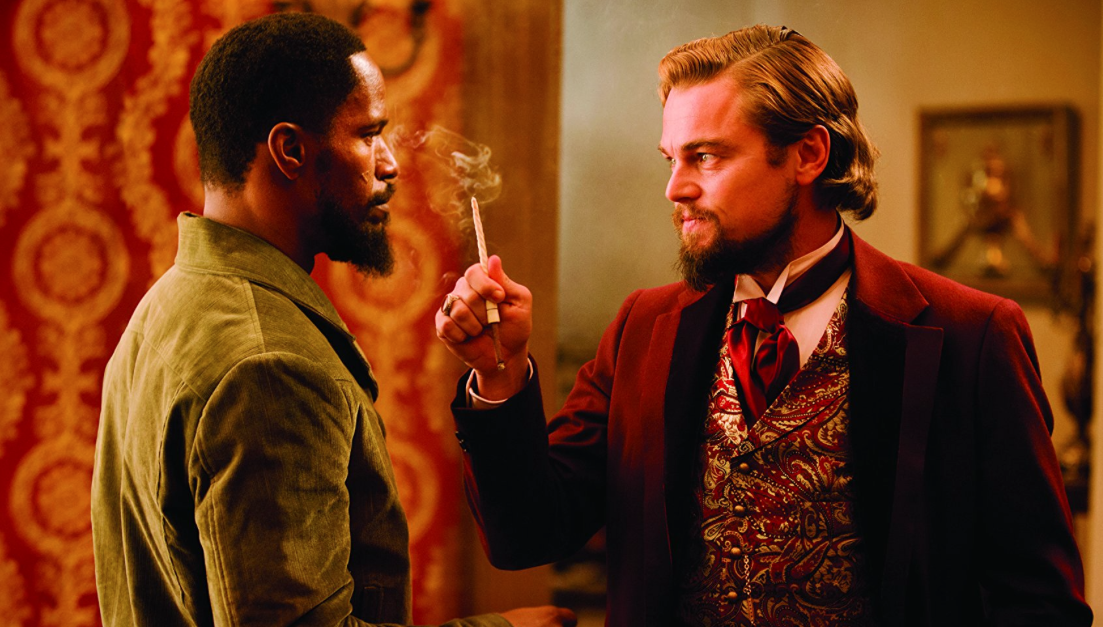“Oh man, it’s a nasty business.” Dr. King Schultz (Christoph Waltz), the German bounty hunter who kickstarts Quentin Tarantino’s latest opus, is talking about the weals left behind on the ankles of the slave he’s just liberated. He could, of course, be talking about slavery in general; and one suspects some viewers may well end up expressing similar sentiments in relation to Tarantino’s trademark down ‘n’ dirty methodology, to which Django Unchained emerges as itself fatally shackled. Those fanboys who’ve sustained Tarantino’s career in claiming him as one of their own will doubtless turn out en masse, whatever Spike Lee has to say; everyone else might be advised to approach with some caution.
The director’s magpie tendencies are again on full display: the new film is born out of nerdy love for such savage late 60s Westerns as Sergio Corbucci’s Django, which wasn’t strictly concerned with race, and those florid 70s plantation melodramas (most notably, 1975’s Mandingo), which most certainly were, being crossovers from the blaxsploitation hits to which Tarantino has already paid fulsome homage. His Django (Jamie Foxx) is thus a freed slave, setting out across pre-Civil War America in search of his beloved, to the accompaniment of 60s TV and film themes, Ennio Morricone songs and gangsta rap.
Objecting to the film on racial grounds, as Lee has done, is ascribing a real-world complexity to Django Unchained that isn’t there; we’re once more passing through that wholly constructed realm known as Tarantinoland, where there is no such thing as questionable taste, and brutal violence, glib wisecracks and haphazard revisionism can be excused by the presence of broad, nominally inclusive, artfully drawn quotation marks – the same thinking that permits Seven Psychopaths a BAFTA nomination for openly admitting how rubbish its female characters are.
Granted, Django is artfully drawn – more so than the slaphappy Inglourious Basterds, at least. Cinematographer Robert Richardson notes both the cold of the mountains and the motes of cotton drifting in the unrelenting Mississippi sun, before revelling in the film’s candlelit interiors. And I don’t deny Tarantino’s ability to write colourful characters, in various skintones. There’s Waltz’s Dr. King (geddit), educating Django in the ways of gunslinging; Don Johnson, as a slaveowner apparently dressed as Colonel Sanders; Leonardo diCaprio, all peacocking privilege as plantation boss Calvin J. Candie; and Samuel L. Jackson as the latter’s doddering house slave Stephen, whose grey eyebrows speak of the most terrible compromises.
While it’s out on the range, Django Unchained provides an entertaining ride; but once it moves indoors, sluggishness takes over, from which only jolting paroxysms of violence can hope to rescue it. At two hours and forty-five minutes, the film does little to overturn Tarantino’s reputation as the most indulged filmmaker in American cinema: this particular moviebrat solely needed a Roger Corman to pare back his worst instincts, not a sugar daddy like Harvey Weinstein, giving into his every demand.
All Weinstein’s money is up there on the screen when Tarantino stages a midnight Klan raid, but in an echo chamber like this, what resonates loudest in such scenes isn’t the clatter of hooves, or the echoes of D. W. Griffith this imagery may set off, but the sound of the director himself, giggling and snickering. The problem with Tarantino has never been that you can’t hear his voice coming through; it’s that you start to feel his breath condensing upon your neck.
In the season of the lifeless Les Mis, maybe we shouldn’t mark down such energy, but equally it’s hard to applaud when it so obviously gets the better of the individual generating it. Having initially spared us the sight of a slave being ripped apart by dogs, Tarantino returns to the scene by way of cuing the eruption of ultra-violence his fanbase craves. Soon the film is all exploding heads and ribcages – Peckinpah without an iota of the gravity or reflection – and whatever non-adolescent enjoyment there is here simply drains away with the blood.
As the upcoming Lincoln suggests, there is another way of addressing America’s historical scars, and that’s through dialogue: the kind of dialogue Tarantino can still knock out in his sleep, which allows the wizardly Waltz to steal off with every other scene, and allows Foxx to register as perhaps the most compelling figure of all here, merely by staying silent while everybody else gabs on. This witty double-act is the best of Django Unchained; the violence it’s eventually lost to is that of a teenager pulling the wings from flies and seeking to impress his peers with such indiscriminate cruelty. Quentin Tarantino, the fanboy’s fanboy, is fifty years old this year.
(MovieMail, January 2013)
Django Unchained is available on DVD through Sony, and to rent via Amazon Prime.

No comments:
Post a Comment